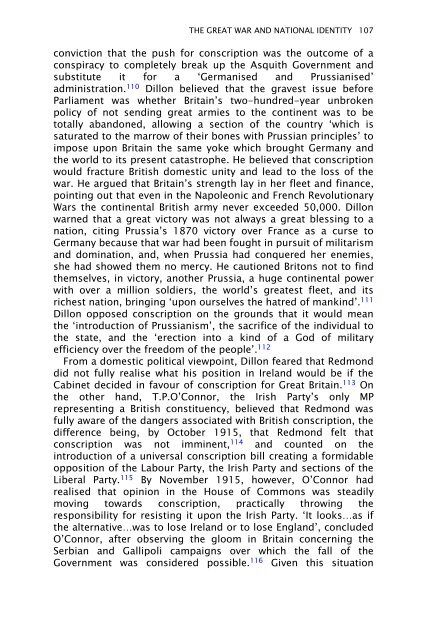Dividing Ireland: World War I and Partition
Dividing Ireland: World War I and Partition
Dividing Ireland: World War I and Partition
You also want an ePaper? Increase the reach of your titles
YUMPU automatically turns print PDFs into web optimized ePapers that Google loves.
THE GREAT WAR AND NATIONAL IDENTITY 107<br />
conviction that the push for conscription was the outcome of a<br />
conspiracy to completely break up the Asquith Government <strong>and</strong><br />
substitute it for a ‘Germanised <strong>and</strong> Prussianised’<br />
administration. 110 Dillon believed that the gravest issue before<br />
Parliament was whether Britain’s two-hundred-year unbroken<br />
policy of not sending great armies to the continent was to be<br />
totally ab<strong>and</strong>oned, allowing a section of the country ‘which is<br />
saturated to the marrow of their bones with Prussian principles’ to<br />
impose upon Britain the same yoke which brought Germany <strong>and</strong><br />
the world to its present catastrophe. He believed that conscription<br />
would fracture British domestic unity <strong>and</strong> lead to the loss of the<br />
war. He argued that Britain’s strength lay in her fleet <strong>and</strong> finance,<br />
pointing out that even in the Napoleonic <strong>and</strong> French Revolutionary<br />
<strong>War</strong>s the continental British army never exceeded 50,000. Dillon<br />
warned that a great victory was not always a great blessing to a<br />
nation, citing Prussia’s 1870 victory over France as a curse to<br />
Germany because that war had been fought in pursuit of militarism<br />
<strong>and</strong> domination, <strong>and</strong>, when Prussia had conquered her enemies,<br />
she had showed them no mercy. He cautioned Britons not to find<br />
themselves, in victory, another Prussia, a huge continental power<br />
with over a million soldiers, the world’s greatest fleet, <strong>and</strong> its<br />
richest nation, bringing ‘upon ourselves the hatred of mankind’. 111<br />
Dillon opposed conscription on the grounds that it would mean<br />
the ‘introduction of Prussianism’, the sacrifice of the individual to<br />
the state, <strong>and</strong> the ‘erection into a kind of a God of military<br />
efficiency over the freedom of the people’. 112<br />
From a domestic political viewpoint, Dillon feared that Redmond<br />
did not fully realise what his position in <strong>Irel<strong>and</strong></strong> would be if the<br />
Cabinet decided in favour of conscription for Great Britain. 113 On<br />
the other h<strong>and</strong>, T.P.O’Connor, the Irish Party’s only MP<br />
representing a British constituency, believed that Redmond was<br />
fully aware of the dangers associated with British conscription, the<br />
difference being, by October 1915, that Redmond felt that<br />
conscription was not imminent, 114 <strong>and</strong> counted on the<br />
introduction of a universal conscription bill creating a formidable<br />
opposition of the Labour Party, the Irish Party <strong>and</strong> sections of the<br />
Liberal Party. 115 By November 1915, however, O’Connor had<br />
realised that opinion in the House of Commons was steadily<br />
moving towards conscription, practically throwing the<br />
responsibility for resisting it upon the Irish Party. ‘It looks…as if<br />
the alternative…was to lose <strong>Irel<strong>and</strong></strong> or to lose Engl<strong>and</strong>’, concluded<br />
O’Connor, after observing the gloom in Britain concerning the<br />
Serbian <strong>and</strong> Gallipoli campaigns over which the fall of the<br />
Government was considered possible. 116 Given this situation








